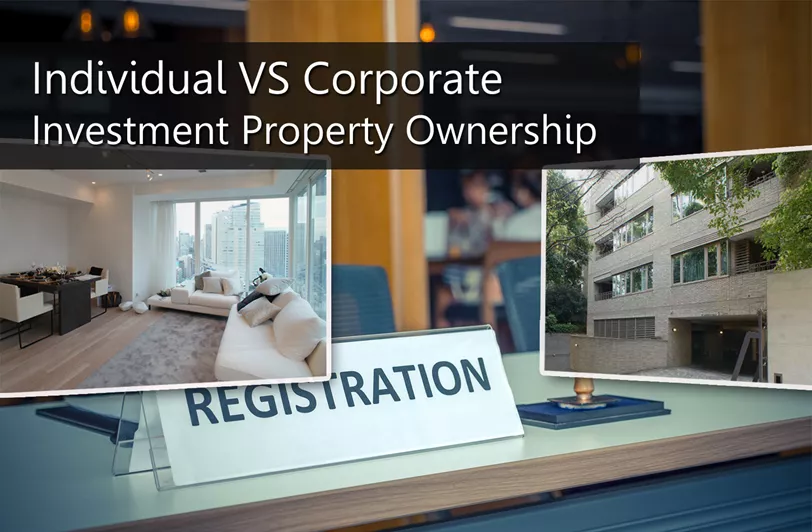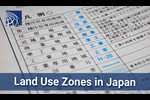Individual VS Corporate Investment Property Ownership in Japan
Should you register your Japanese investment property under your own name, or under a corporate structure? What are the advantages or disadvantages of both options? How about tax implications? Accessibility to financing?
Below is the transcript of an interview we conducted on our PodCast, with Mr Sadaysu Ito of Sadywell Accounting- a corporate accounting firm from Tokyo, Japan, who answers all of these questions, and more.

(To listen to the original episode, click here)
(Transcript as follows) -
Ziv: Sadaysu sama, thank you very much for taking the time to join us today, we know you're very busy, so we're going to dive right in. We've touched briefly upon taxes in a previous episode, and we know that here in Japan, real estate property investment income tax is charged as part of the normal income tax payable by individuals, which is quite low in comparison with other developed countries. Also, we know that there are no special taxes that apply to non-residents who purchase investment properties here.
Actually, and I think you're going to talk about this in a moment, non-resident investors are exempt from some local taxes, such as inhabitant tax, municipal taxes, etc - so, generally speaking, it looks as if it's always beneficial for people to be buying their investment properties as individuals, and not through a corporate entity.
Is this always the case, or are there other advantages in purchasing as an incorporated entity? Could you maybe give us a short explanation about the differences in taxation, and when it becomes more beneficial to switch from individual ownership to corporate, if that's ever the case at all?"
Sadayasu: That's correct, in Japan, tax rates for individuals on real estate investment income isn't really high. The biggest difference between an individual and a corporation is that, for individuals, we adapt a progressive taxation system - the lowest tax rate is just 5%, and the highest is 40%. For corporations, on the other hand, the basic tax rate is fixed at 34%. If your taxable income is less than around 70,000 USD annually, for example, your effective tax rate as an individual will be around 23% - but corporate tax rate will be fixed at 34%.
However, if your revenue from real estate and other income increases, eventually the individual tax rate will exceed the corporate tax rate. If taxable income exceeds 350,000 USD annually, the corporate tax rate will be lower than the individual tax rate.
Another advantage of investing under a Japanese incorporated company is that Japanese incorporated companies can carry losses forward up to 9 years, whereas individuals can only carry them forward for 3 years. In reality, when you start investing, it's difficult to turn a profit in the first year, because there are many costs, and it may take time to tenant the property. In these cases, you will have a loss during the first years. If you're an incorporated entity, you will be able to carry those losses forward for 9 years, and offset them against your future income, to reduce your tax obligations. This is one of the biggest advantages for corporations.
Ziv: I see. Are there any other advantages? Any other expenses that one can claim?
Sadayasu: Yes, as far as expenses go, and compared with individuals, an incorporated entity can have more expenses recognized. For instance, an individual owning investment property can't pay themselves a salary. You could pay your spouse a salary if they're doing work related to the investment operations, but that's limited only to your spouse. Corporations, on the other hand, can issue a salary to you as well, as director of the company, and also to other family members and relatives who are supporting the company - those salaries are then regarded as company expenses, and so forth - so there are more recognizable expenses for companies, compared with individual owners of investment real-estate, which is another advantage.
Ziv: Ok, so it's really a matter of how high your income or projected income is going to be, and how much tax you're going to be paying on it as an individual, as opposed to a company - and also whether you've got any unusual expenses that you're going to be able to claim as deductions - is that right?
Sadayasu: Yes, that's correct. The most important point to consider is the scale of your profits.
Ziv: Right. And, obviously, everyone's circumstances are different, so it's always best to consult either with Sadaysu san himself, or any other professional and certified accountant here in Japan, as well as in the investor's country of residence - because there are some issues regarding double taxation, tax treaties, which will depend on whatever your income level is in your country of residence. So, these will all help you determine the best course of action in your particular case.
Now, Sada san, aside from everything else that you've just explained, are there any other advantages for property investors in setting up a local Japanese company, or, in case of non-residents, maybe a branch of subsidiary of a foreign corporation? What are the main differences between all of these possible structures?
Sadayasu: Well, investing as a foreign individual gives you some advantages, because you don't need to pay the local inhabitant tax, which you're exempt from if your residency isn't in Japan. And the local inhabitant tax rate for individuals is quite high - 10% of your taxable income. We've just mentioned that the minimum income tax rate for individuals is 5% - but if you're living in Japan, you have to pay an additional 10% inhabitant tax. Which effectively turns the lowest tax rate for individuals to 15%, and the highest to actually 55% - which I think is quite high...
Ziv: Very high, yes!
Sadayasu: If you establish a corporation, as well, that company is then regarded as a Japanese resident, which means that if it's established in Japan you then also need to pay that same inhabitant tax. The same goes for a branch of a foreign company, that's also considered a Japanese entity, so subject to the same local taxes.
So, to summarize the different structures, there are three ways to invest in property in Japan. The first is as an individual, the second is to establish a subsidiary company in Japan, and the third is a branch office...
Ziv: By that you mean a subsidiary or branch of a foreign company, which establishes an office in Japan?
Sadayasu: Well, it doesn't have to be a subsidiary of a foreign company. You can also establish a company in Japan if you, as the major share-holder, are living overseas, that's also possible. Taxation will be the same in both cases.
The third option is to establish a branch of a foreign company in Japan. The biggest difference between the subsidiary and the branch is in legal liabilities for Japanese entities - if it's a branch, the branch and the head office are regarded as the same legal entity. So if someone, for example, sues the branch in Japan, and the branch bears liability to that party, the foreign head office carries these liabilities on behalf the Japanese branch, since they are the same entity. On the other hand, if the sued entity is a subsidiary company, and they have a parent company or individual owner overseas, the two are regarded as separate entities, so the foreign investor isn't at risk. If the subsidiary company goes bankrupt, that's as far as the damage goes.
The other main difference between the subsidiary and the branch from a taxation point of view is that the branch and the head office, as I've mentioned, are the same legal entity. So, if you're making a loss in the Japanese branch and a profit at the head office, you can offset the loss in Japan against the profit overseas...
Ziv: Oh, that's very handy!
Sadayasu: ...which means you have a lower tax liability in your country of residence.
Ziv: I see. And what about money transfers? Is it easier, harder?
Sadayasu: Money transfers for branches is much easier in comparison with subsidiary companies or individual owners. Because, in the case of a branch, transferring money within the same company is very simple - you just transfer the money, that's it. However, in the case of a subsidiary company, which is a separate entity, there are two ways to transfer the money overseas - by dividend or interest payment. Both ways are subject to withholding income tax in Japan. If your country and Japan have a tax treaty you may be exempt from withholding income tax, or be entitled to a lower rate - but you'll need to submit some documents to the tax office before making the payment, which means there will be additional accounting costs.
Ziv: Right. And that's all included in your services, as an accounting company for foreigners?
Sadayasu: Yes, of course, I provide those services. Another problem is that, in Japan, taxation for branch offices is a bit complicated, it's a very specialized area in Japanese taxation law, so not all accountants can do that - but we can support that, yes.
Ziv: Understood. Ok, that's great, that makes things much clearer and easier to understand, thank you.
Now one more question for you - one of the things that most people always inquire about when they want to kick off their Japanese property investment portfolio is the possibility of financing from local banks, or other ending institutions. Unfortunately, it seems as if there are very few options available for non-residents. Could you maybe explain a bit, I know it's not your area of expertise, but could you explain a bit about bank lending criteria here in Japan, and what people can do, if they even can, to try and secure financing for their property purchases here?
Sadayasu: Yes, sure. Actually I receive the same type of questions from my clients and potential clients, they want to get financing from Japanese banks, because interest rates are low. But, in general, Japanese banks are reluctant to offer loans to non-residents, because in case investors can't pay back the loan, there's no way for the Japanese bank to chase them and collect that money. So usually they only provide loans to Japanese residents. You can be a foreigner, but you need a longer term visa, such as a spouse visa sponsored by a Japanese spouse - but if you're overseas, not many banks will offer you a loan. And usually, before getting the loan there's a face to face interview, which is usually conducted in Japanese, during which you'll need to explain how your business will be making enough profit to pay back the loan.
But, I think, because recently incoming investments from overseas into Japan are increasing, and I know some banks and "non-banks" - meaning, institutions that don't provide bank accounts, just loans - some of these can offer loans, but they set a mortgage on the property. So, for example, if the value of the property is, let's say, 500,000 US dollars, they can probably offer you 50-60% of the property's value, and the rest of the funds have to be in cash. The criteria varies a lot, depending on the investor's financial situation.
Ziv: Ok, so, again, that makes it much clearer, thank you. So, generally speaking, you have to have a long term presence in Japan, either as a resident or as a company, right?
Sadayasu: Yes, that's basically right. I also want to talk about whether having a company in Japan will help you obtain a loan. It will, actually. However, if you just register the company but, in reality, no one is working there, the bank won't trust you. If you have a physical office, establish a company with an actual office and employees, the bank may trust you. And, in general, getting a loan in Japan means submitting a tax return and financial statements for the past three years, which both need to show you're making a profit.
Ziv: And we do that using the tax statements, is that right?
Sadayasu: Yes, that's the official document submitted to the tax office.
Ziv: Ok, so you have to have long term residency of some sort, an income tax payment history for a few years, and if you're a company, you also have to employ local Japanese staff, right?
Sadayasu: Yes, or at least staff who are in Japan...
Ziv: Well, that helps, right?
Sadayasu: Yes, you need to have a presence here. Because, if it's a branch office, and suddenly they go away, or back to their country, the Japanese bank, again, won't be able to chase them overseas to collect.
Ziv: Understood. Great, thank you very much for your time, Sada san, I'm sure our listeners will find this information very helpful. And again, folks, we can't stress this enough - unless you're just going to be buying a few cheap apartments, in which case you may be under the income tax reporting threshold, which is about 3,600 US dollars net annually - if you're anywhere above that, the best way to maximize your profits and minimize your expenses is to take the time and the effort to consult with an accountant here in Japan. Now, obviously, we think "Sadywell Accounting" is your best bet, but in any case, consult with someone, and get your infrastructure and business plans set up properly BEFORE purchasing your first property, this strategy is bound to save you a lot of money, and a lot of potential headaches in the future, as your portfolio grows.
Ziv Nakajima-Magen
Nippon Tradings International 
Ziv Nakajima-Magen is a partner and executive manager at Nippon Tradings International (NTI), a buyers agent and proxy company assisting investors worldwide in buying, selling and managing Japan real estate property investment portfolios.

- Apartments and Houses for Sale in Tokyo
- Listings of apartments, condominiums, and houses available for purchase in Tokyo.






















